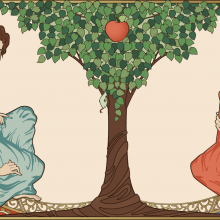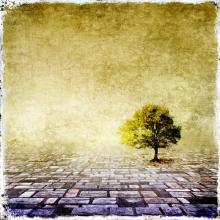garden of eden
Loving him is like
floating the Euphrates toward a dead-end stream:
faster than the wind, passionate as sin,
winding so serpently.
When Adam and Eve eat from the Tree of Knowledge in the Garden of Eden, the deed actually is done, so to speak, before they take a bite of fruit. They both know better before they do the deed, but they do it anyway. But like baptism, eating the fruit is an outward expression of an inward choice. And although the law in our culture says that ignorance is no excuse, sin is a little bit different. The truly sinful act takes place when we know better but don’t do better.
And what happens then?
The world as we know it may end on Oct. 17.
This statement seems hyperbolic. It sounds like another absurd prediction of the end times that garners far too much attention from the media. But this isn’t about the fulfillment of biblical prophecy. Unless the Congress raises the debt ceiling, Oct.17 is the date that the United States government runs out of money to pay its bills.
The consequences could be catastrophic.
Defaulting on our financial obligations would shatter the global confidence in the U.S. dollar that has made it the worldwide reserve currency. U.S. Treasury bonds would no longer be perceived as safe investments, which means creditors would demand higher interest rates to purchase the bonds because of the increased investment risk. The rise in interest rates would make U.S. debt more expensive to finance, leading to more government spending and slower economic growth. The U.S. Treasury believes a default could cause another recession far worse than what we experienced in 2008.
Of course, this pending crisis is completely manufactured and entirely avoidable.
It's odd that Christians — people who claim to believe that God created the earth, sustains it day by day, and intends to create a new earth — are often so mixed up about sex and food. How long would the earth's inhabitants last without coupling and eating?
And yet most Christian writers right up to the 16th century praised celibacy, sexless marriages, and arduous fasting. Bless Martin Luther for loving his wife (and the beer she brewed), but lots of us still seem to think that good sex and good food — if not actually sinful — are at least pretty low on the religious values hierarchy.
Has it escaped our attention that, according to our most sacred literature, God made a naked male and a naked female, put them in the midst of grain fields and orchards, and told them to multiply?
If we're going to talk about food, we need to start with theology. Before chocolate was invented, a snake put "sinfully delicious" and "decadent" on the menu. Somebody fell for the marketing ploy, and we've had a complicated relationship with food ever since.
We've also had a complicated relationship with sex, and with siblings, and with weapons of mass destruction. It's all there in Genesis (where the WMDs are swords). And pretty soon, right-thinking people started coming up with rules to keep people from doing bad things. You can have sex with this person but not that one. You really shouldn't deceive, sell, or kill your brother. Beat your swords into plowshares.
The rules helped to restrain bad guys, and they gave would-be good guys some helpful pointers. Still, there were plenty of bad guys to go around, and good guys could get pretty anal about what other people should or shouldn't do. Anyway, it's obvious that you don't create a good marriage simply by avoiding sex with the wrong person, and you don't have a pleasant Thanksgiving dinner simply by not killing your siblings, and you don't banish war simply by wiping out as many weapons as possible. The rules are helpful — adultery, fratricide, and genocide are really bad ideas —but if you want a Peaceable Kingdom, you're going to need more than rules.
Water tower located in Pleasantville, Iowa. By Ashton B Crew for Photo taken for www.randomiowa.com. Via Wikimedia Commons
In some way or other, I think it’s safe to say that we all have a kind of nostalgia for the innocence and purity of the Garden of Eden before what we call “the fall.” We have a sense that we are not supposed to be outside the gates of the Garden … out here. At the expulsion of the man and the woman in the story from Genesis, the cherubim (angels) are posted at the gate to be sure that those who have been expelled cannot get back in. The cherubim and a twirling, flaming sword keep Adam, Eve — you, me, all of us — on this side of the gate, outside the Garden of Eden.
Well it’s a story, of course, but isn’t it our story? Nostalgic for a world where nothing ever goes wrong. But illness comes, a marriage goes bad, a relationship with someone you love falls apart just when you think it’s to lead to something more permanent, you lose a job, you suffer depression, you suffer from an illness, you’re left alone in grief over the loss of a loved one. Or you yourself are dying, and there are wars and rumors of wars. We watch the children and wish that we could protect them, but we can’t, even though we are parents and grandchildren, aunts and uncles. Out here, outside the Garden, it’s rough sometimes.
When people talk about the fall of humanity in the Jewish Genesis story, we never talk much about the Tree of Life. The Tree of the Knowledge of Good and Evil gets all the headlines and sermons because that’s the one that’s supposed to define us. That’s what we see, when we look around at humanity: The Fall, and a lot of evil triumphing over good.
Martin Luther, the father of Protestant churches, “was once asked what God was doing before the creation of the world,” according to German Lutheran theologian Dietrich Bonhoeffer. “His answer was that he was cutting canes for people who ask such useless questions.”
Who says you can’t offer a doctrine of abundant grace with a bit of sarcastic wit? For Bonhoeffer, this was really a question of why. Why did God create? What was going on, such that God decided to make a world? As Bonhoeffer saw it, this is a question rooted in guilt, shame, and fear. It’s really asking: What did God want of the world? What did God make me for? Am I living up to it? Am I accepted? It’s a question falling from the Tree of the Knowledge of Good and Evil, not the Tree of Life.
On the first Monday of September, America honors working stiffs by taking a paid day off. But does Labor Day celebrate an enterprise that God intended to be a punishment?
In a recent New York Times essay on the frenetic hustle of modern life, humorist and author Tim Kreider took the Puritans and their infamous work ethic to task. They had turned toil into a virtue, he argued, whereas God had invented it to chastise the disobedient Adam and Eve.
In an interview, Kreider explained that he was referring to Genesis, in which God tells Adam “by the sweat of thy brow shalt thou eat thy bread.” In the same chapter, the serpent is sentenced to an eternity of belly slithering and Eve condemned to severe childbearing pains.
“Coming as it does on the heels of the infamous Illicit Fruit Incident, the details of which there’s no need to re-hash, certainly makes it sound punitive,” said Kreider, who said he’s a veteran of 18 years of Sunday school, but no Bible scholar.
A couple hours ago on Facebook, Catherine posted that she had just seen a snake on her hike. As her pastor I thought it best to reply, “If it starts talking, don’t listen”
This likely came to mind since I was editing this very sermon about Adam and Eve. The story of the Garden of Eden is what is called an origin story and every culture has theirs. Origin stories tell us how the world came about and where we came from and other important things like why snakes don’t have legs. We think we might know our origin story really well, but in the Genesis account of the Garden of Eden, there actually is no mention of sin, or a fall, or Satan, or temptation, and I hate to break it to you but there wasn’t even an apple involved. Which means the cultural understanding of the story of the Garden of Eden is slightly corrupted. This is due in part to the countless paintings throughout the history of Western art which for some reason portray a tree and a snake and an extremely white Adam and Eve holding a Red Delicious.
See, for generations folks have called the tale of Adam and Eve and the serpent and the forbidden fruit “The Fall from grace” or “The story of Original Sin."
That's a little weird to me. Like, God created the heavens and the Earth and animals and it was like, this awesome all-inclusive primeval club-med for Adam and Eve – they ran naked through the warm sunlight of an idyllic paradise and everything was theirs for the taking – except for that one tree that they were told to steer clear of. And this absolute paradise in the garden between God and Humanity lasted approximately 20 minutes. Until Eve had a chat with a talking snake and then disobeyed God and ate the forbidden fruit. And because Eve, ate some fruit she was told not to, now all of humanity is cursed and this so-called original sin of Eve’s became sort of like a sexually transmitted disease.
Because now, according to this version of what the story is about, every person born after that inherited original sin from Eve. That’s right. Eve messed it up for everyone by eating some piece of fruit God told her not to. Which feels kinda unfair to her and kinda unfair to us. But this is what we are told the story is about.
They say at some point in their lives great leaders experience a "dark night of the soul," or a period in life when your feet, knees, and face scrape and stick to the proverbial bottom." It is a time when even your soul feels forsaken. Ultimately, the dark night is not about the suffering that is inflicted from outside oneself, even though that could trigger it. It is about the existential suffering rooted from within. St. John of the Cross, the 16th century Carmelite priest, described it as a confrontation, or a healing and process of purification of what lies within on the journey toward union with God.
"Whenever you face trials of any kind," explained the apostle James, "consider it nothing but joy, because you know that the testing of your faith produces endurance; and let endurance have its full effect, so that you may be mature and complete, lacking in nothing." (James 1:2-4)
My favorite characters in The Lord of the Rings are the Ents -- an ancient race of giant living, talking, breathing trees in J.R.R. Tolkien's fictional land, Middle Earth. I have a little confession to make: Whenever I hear a reading from Isaiah 55 where it says, "The mountains and hills before you shall burst into song and all the trees of the field shall clap their hands," I always picture the Giant Ents from The Lord of the Rings. And then I picture these clapping trees from Isaiah holding little Hobbits in their branch arms in what ends up a willful conflation of Middle Earth and Major Prophet.
[Continued from part 1] More reflections from the North Park Theological Seminary's Scripture Symposium on "The Idolatry of Security."







